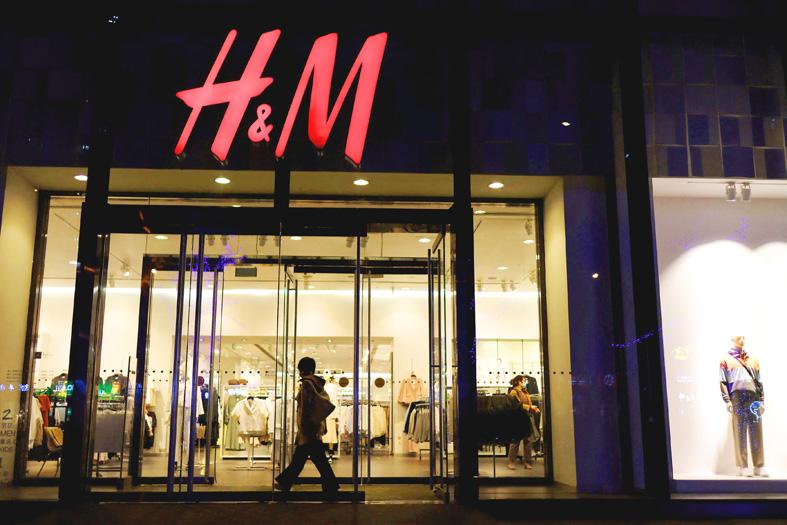Amid a rising wave of nationalism, Chinese shoppers have mounted at least 78 boycotts of foreign companies since 2016, more than six times the number seen in the preceding eight years, a new study found.
While consumer brands all face the same complex operating environment in China, how they get out of hot water differs depending on the issue, research by the Swedish National China Centre found.
In general, companies quickly apologize when they are being boycotted for issues around territory China considers sovereign, but far less frequently when it comes to the topic of alleged human rights violations.

Photo: Reuters
More than 80 percent of companies apologized upon facing backlash for actions or advertising seen as infringing on China’s territorial integrity, such as the status of Taiwan or Tibet, or the pro-democracy protests in Hong Kong.
By contrast, only about one-quarter of firms expressed regret after making a stance against sourcing products from Xinjiang — the province where China is accused of human rights violations against the ethnic Uighur group.
The varying degree of sensitivity at play is reflected in how the same company responded differently to boycott threats. Walmart Inc apologized in 2018 over a sign in one of its Chinese stores that listed Taiwan, and not China, as the origin of some products, but did not last year amid social media allegations that Xinjiang-sourced products were taken off shelves, the study said.
The findings underscore how China’s 1.4 billion shoppers have gone from an untapped goldmine to a potential minefield for global consumer brands. With Asia’s biggest economy facing off with the US and others on everything from trade to cybersecurity and human rights to the origins of the COVID-19 pandemic, Chinese shoppers have become an economically powerful arm of Beijing’s political agenda, hurting revenue growth for companies from Nike Inc to Hennes & Mauritz AB (H&M).
“The emergence of alternative domestic products in China and a rise in online nationalism are putting a lot of pressure on global brands,” said Hillevi Parup, coauthor of the study in an e-mail interview.
“Consumer boycotts are on the rise in China and this trend does not appear to be going away anytime soon,” Parup asid.
Despite the hostile atmosphere, nearly half of the targeted companies weathered controversies without a public apology, the study said.
H&M — the biggest corporate target in the Xinjiang-related boycott wave last year — did not apologize, saying that it has always respected Chinese consumers and was devoted to its long-term growth in the country. The clothing brand is still not available on nearly all e-commerce platforms in China.
The study also found that the public reaction to company apologies “appears arbitrary.”
In some cases, an apology led to further backlash, with social media users calling out firms such as Hugo Boss AG for being “two-faced.”
“An apology isn’t a safe bet,” Parup said. “Based on our observations, the best option may be to try to avoid the public eye altogether.”
The varying apology rate could be due to intense scrutiny on Xinjiang’s forced labor issue in Europe and North America.
While firms might be able to stomach the reputational cost of being less supportive of Taiwan’s sovereign claim, for example, “it is much harder to imagine that they would be comfortable with accusations of being implicated in what some western parliaments and governments have labeled genocide,” the study said.
Intel Corp apologized in December last year after its opposition to Xinjiang labor sparked a backlash in China. Soon after, then-White House press secretary Jen Psaki said that “American companies should never feel the need to apologize for standing up for fundamental human rights or opposing repression.”
The study also found that the economic payoff of toeing China’s line was unclear.
Hugo Boss and Burberry faced Chinese consumers’ ire for statements related to Xinjiang. Hugo Boss apologized and Burberry declined to comment, but neither saw a significant drop in sales, the study said.
The think tank examined boycott incidents between 2008 and last year. Besides the general intensification since 2016, researchers found that boycotts peaked in 2019, when the US-China trade dispute was playing out.
The targeted attacks by Chinese consumers in the past few years have also displayed evidence of state support, the study said.
State-run media, for example, supported a 2019 campaign against luxury brands, including Coach, Versace and Givenchy, for failing to respect China’s territorial integrity.
“We have found evidence of state support in nearly a third of all boycotts, but this figure likely underestimates the true level of state involvement,” Parup said.
The Swedish National China Centre was established last year and is largely funded by the Swedish government to inform policymakers and businesses about China.

LANDMARK CASE: ‘Every night we were dragged to US soldiers and sexually abused. Every week we were forced to undergo venereal disease tests,’ a victim said More than 100 South Korean women who were forced to work as prostitutes for US soldiers stationed in the country have filed a landmark lawsuit accusing Washington of abuse, their lawyers said yesterday. Historians and activists say tens of thousands of South Korean women worked for state-sanctioned brothels from the 1950s to 1980s, serving US troops stationed in country to protect the South from North Korea. In 2022, South Korea’s top court ruled that the government had illegally “established, managed and operated” such brothels for the US military, ordering it to pay about 120 plaintiffs compensation. Last week, 117 victims

China on Monday announced its first ever sanctions against an individual Japanese lawmaker, targeting China-born Hei Seki for “spreading fallacies” on issues such as Taiwan, Hong Kong and disputed islands, prompting a protest from Tokyo. Beijing has an ongoing spat with Tokyo over islands in the East China Sea claimed by both countries, and considers foreign criticism on sensitive political topics to be acts of interference. Seki, a naturalised Japanese citizen, “spread false information, colluded with Japanese anti-China forces, and wantonly attacked and smeared China”, foreign ministry spokesman Lin Jian told reporters on Monday. “For his own selfish interests, (Seki)

Argentine President Javier Milei on Sunday vowed to “accelerate” his libertarian reforms after a crushing defeat in Buenos Aires provincial elections. The 54-year-old economist has slashed public spending, dismissed tens of thousands of public employees and led a major deregulation drive since taking office in December 2023. He acknowledged his party’s “clear defeat” by the center-left Peronist movement in the elections to the legislature of Buenos Aires province, the country’s economic powerhouse. A deflated-sounding Milei admitted to unspecified “mistakes” which he vowed to “correct,” but said he would not be swayed “one millimeter” from his reform agenda. “We will deepen and accelerate it,” he

‘HYANGDO’: A South Korean lawmaker said there was no credible evidence to support rumors that Kim Jong-un has a son with a disability or who is studying abroad South Korea’s spy agency yesterday said that North Korean leader Kim Jong-un’s daughter, Kim Ju-ae, who last week accompanied him on a high-profile visit to Beijing, is understood to be his recognized successor. The teenager drew global attention when she made her first official overseas trip with her father, as he met with Chinese President Xi Jinping (習近平) and Russian President Vladimir Putin. Analysts have long seen her as Kim’s likely successor, although some have suggested she has an older brother who is being secretly groomed as the next leader. The South Korean National Intelligence Service (NIS) “assesses that she [Kim Ju-ae]